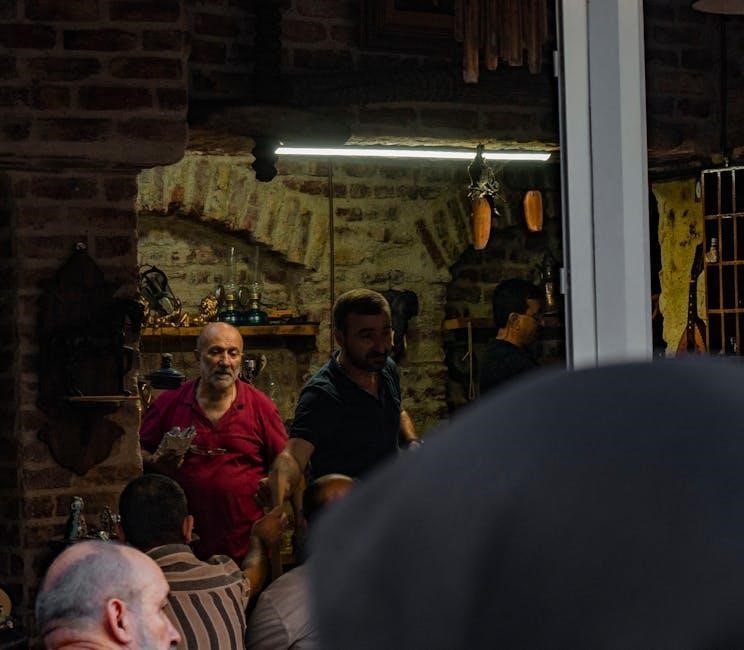The Reluctant Fundamentalist, a novella by Mohsin Hamid, delves into cultural and political themes through Changez’s reflective narrative, exploring identity, globalization, and post-9/11 tensions succinctly․
1․1 Overview of the Book
The Reluctant Fundamentalist is a thought-provoking novella that explores themes of identity, culture, and politics through a monologue by Changez, a young Pakistani man․ Set in Lahore, the story unfolds as Changez recounts his journey to an unnamed American visitor, reflecting on his experiences in the U․S․, his relationship with Erica, and the evolving tensions post-9/11․ The book challenges perceptions of cultural divides and globalization’s impact on individuals and societies, offering a nuanced exploration of power dynamics and personal identity․ Its concise yet powerful narrative makes it a compelling read for understanding contemporary global tensions․
1․2 Author Background: Mohsin Hamid
Mohsin Hamid is a celebrated Pakistani author known for his insightful and nuanced exploration of identity, culture, and globalization․ Born in 1971 in Lahore, Pakistan, Hamid studied at Princeton and Harvard․ His writing often blends personal narratives with broader political and social themes․ The Reluctant Fundamentalist is his second novel, following Moth Smoke, and has received critical acclaim for its unique storytelling and thought-provoking commentary on post-9/11 dynamics․ Hamid’s work is praised for its lyrical prose and ability to bridge cultural divides, making him a prominent voice in contemporary literature․
1․3 Historical Context
The Reluctant Fundamentalist is set against the backdrop of the post-9/11 world, exploring the tensions between the East and the West․ The novel reflects the global political climate, particularly the impact of the War on Terror, the invasion of Afghanistan, and the rise of anti-American sentiment in Pakistan․ These historical events shape the protagonist’s identity and the narrative’s exploration of cultural and ideological conflicts, offering a nuanced perspective on a volatile era․

Plot Summary
The Reluctant Fundamentalist follows Changez, a young Pakistani man, recounting his journey from Princeton to Lahore, exploring his complex relationship with America and Erica, leading to a tense confrontation․
2․1 The Storyline
The Reluctant Fundamentalist unfolds as Changez, a Pakistani man, narrates his life story to an unnamed American stranger in a café in Lahore․ Through flashbacks, Changez reflects on his journey from Lahore to Princeton University, where he excelled academically and landed a prestigious job at Underwood Samson․ His relationship with Erica, a traumatized American woman, and the aftermath of the 9/11 attacks deeply shape his identity and worldview, leading to a tense confrontation with his American ideals․
2․2 Key Events and Turning Points
The narrative centers on Changez’s journey from Lahore to Princeton University, where he excels academically and lands a prestigious job at Underwood Samson․ His relationship with Erica, a troubled American woman, deepens, but her emotional instability and tragic past complicate their bond․ The 9/11 attacks serve as a pivotal moment, triggering Changez’s growing unease with American ideals and his eventual return to Pakistan․ These events highlight his internal conflict and evolving identity, culminating in a tense encounter with an American stranger in Lahore․
Themes in “The Reluctant Fundamentalist”
The novel explores identity, cultural clashes, globalization, and religion, offering a profound commentary on post-9/11 tensions and the complexities of East-West relationships through Changez’s narrative․
3․1 Identity Crisis
Changez’s journey reflects a profound identity crisis as he navigates between his Pakistani heritage and his American experiences․ Struggling to reconcile these dual worlds, he faces internal conflict, questioning his belonging and purpose․ This tension is exacerbated by post-9/11 realities, where cultural and political divides deepen, forcing Changez to confront his sense of self and loyalty, leading to a transformative realization about his place in a globalized world․ His story becomes a poignant metaphor for the immigrant experience, highlighting the challenges of cultural displacement and the search for identity in a world defined by binaries․
3․2 Cultural Conflicts
Cultural conflicts are central to Changez’s narrative, as he grapples with the clash between Eastern and Western values․ His journey from Lahore to New York highlights the tension between tradition and modernity, faith and capitalism․ The novel underscores the misunderstandings and mistrust that arise from cultural differences, particularly in the aftermath of 9/11․ Changez’s experiences at Underwood Samson and his relationship with Erica symbolize the broader struggle to bridge these divides in a globalized yet fractured world․
3․3 Globalization and Its Impacts
Globalization is a pivotal theme, as Changez navigates the interconnected yet divided worlds of East and West․ His work at Underwood Samson symbolizes corporate globalization, while his internal conflict reflects the cultural dislocation it causes․ The novel highlights how globalization fosters economic interdependence but also perpetuates inequality and cultural erasure, leaving individuals like Changez caught between tradition and modernity, struggling to reconcile their identities with the forces of global capitalism․
3․4 Religion and Fundamentalism
The Reluctant Fundamentalist explores the complexities of religion and its interpretations․ Changez’s journey reflects a subtle shift toward ideological rigidity, though he isn’t traditionally religious․ The novel critiques the notion of religious fundamentalism as a simplistic label, instead portraying it as a multifaceted response to cultural dislocation and political tensions․ It challenges the binary of religious extremism versus secular modernity, offering a nuanced view of faith and identity in a globalized world․
Symbolism in the Novel
The novel employs rich symbolism, with characters and settings representing broader cultural and political themes․ Changez’s journey and interactions reflect the clash of identities and ideologies․
4․1 The Use of Names and Their Significance
In The Reluctant Fundamentalist, names carry profound symbolic weight․ Changez, meaning “change” or “transform” in Urdu, reflects his journey of self-discovery and cultural clash․ Erica, evoking Western ideals, embodies the allure and complexity of American culture․ These names underscore the novel’s exploration of identity, belonging, and the tension between Eastern and Western values, enriching the narrative’s thematic depth and resonance․
4․2 Symbolic Spaces and Settings
The teahouse in Lahore, where Changez narrates his story, symbolizes a bridge between East and West, reflecting cultural blending․ Princeton University represents Western intellectualism and privilege, while New York City embodies global ambition and post-9/11 paranoia․ Lahore itself signifies tradition and homeland, contrasting with the cosmopolitan settings of the West․ These spaces mirror Changez’s internal conflict, highlighting the tension between cultural identity and global interconnectedness in a postcolonial world․

Character Analysis
The novel explores deep character complexities, focusing on Changez’s evolution and internal struggles with identity, cultural clashes, and personal growth, offering profound insights into human emotions and societal influences․
5․1 The Reluctant Fundamentalist: Changez
Changez, a young Pakistani man, narrates his journey of self-discovery and cultural identity․ His transformation from an ambitious professional to a conflicted individual reflects the tensions between East and West․ His relationship with Erica and his internal struggle post-9/11 highlight his emotional depth and moral ambiguity, leaving readers to ponder his true loyalties and motivations, making him a complex and thought-provoking character․
5․2 The Role of Erica
Erica, an American woman, plays a pivotal role in Changez’s life, symbolizing cultural and emotional connections․ Her fragile mental state and unrequited feelings for Changez create tension, reflecting deeper societal divides․ Erica’s character represents both personal and symbolic elements, highlighting the complexities of cross-cultural relationships and the emotional turmoil that accompanies them, ultimately contributing to the novel’s exploration of identity and conflict․ Her presence shapes Changez’s narrative significantly․
5․3 The American: A Symbol of the West
The American in the novel embodies Western ideals and power dynamics, serving as a foil to Changez’s identity struggle․ His presence in the Lahore café symbolizes cultural encounters and misunderstandings․ Through his dialogue and demeanor, Hamid critiques perceptions of the West while highlighting the complexities of cross-cultural interactions․ The American’s character underscores themes of alienation and the clash of global ideologies, resonating deeply with post-9/11 tensions and cultural divides․
Cultural and Social Commentary
The Reluctant Fundamentalist explores cultural divisions and social inequalities, offering a post-9/11 commentary on identity and globalization․ It critiques stereotypes, fostering dialogue between East and West․
6․1 East vs․ West Dynamics
Mohsin Hamid explores the cultural divide between East and West through Changez’s journey․ The novel highlights the tension between traditional Pakistani values and Western modernity, reflecting post-9/11 misunderstandings․ Changez’s internal conflict mirrors broader societal clashes, as he navigates loyalty to his homeland and admiration for America․ The contrast between Lahore’s simplicity and New York’s cosmopolitanism underscores the complexities of cultural identity and global interconnectedness․
6․2 The Impact of 9/11
The 9/11 attacks serve as a pivotal moment in the novel, intensifying cultural tensions and reshaping global perceptions․ Changez experiences heightened scrutiny and prejudice, reflecting the broader climate of fear and mistrust․ The event underscores the ideological divide, forcing Changez to confront his dual identity and the shifting dynamics between East and West․ This backdrop amplifies the novel’s exploration of alienation, suspicion, and the complexities of cross-cultural understanding․

Literary Style and Structure
Mohsin Hamid employs a unique second-person narrative, creating intimacy and immediacy․ The concise, conversational style mirrors Changez’s reflective tone, enhancing the novel’s emotional depth and philosophical inquiry effectively․
7․1 Narrative Technique
Mohsin Hamid’s use of a second-person narrative creates immediacy and direct engagement․ The conversational tone reflects Changez’s introspective nature, blending philosophical musings with personal anecdotes․ The non-linear structure, interspersed with dialogue, builds tension and mirrors Changez’s internal conflicts, while the direct address to “you” draws readers into his emotional journey, enhancing the novella’s psychological depth and thematic resonance effectively․
7․2 Language and Tone
The novel’s language is sparse yet evocative, with a conversational tone that mirrors Changez’s introspective dialogue․ Hamid employs a reflective and lyrical style, blending philosophical musings with personal anecdotes․ The tone shifts between camaraderie and unease, reflecting the tension between East and West․ The direct address to “you” creates intimacy, while the measured pacing underscores the gravity of Changez’s emotional and cultural struggles, enhancing the novella’s psychological depth․
Reception and Reviews
The Reluctant Fundamentalist received critical acclaim for its nuanced exploration of cultural identity and political tensions․ Readers praised its thought-provoking dialogue and emotional depth, sparking global discussions․
8․1 Critical Response
Critics praised The Reluctant Fundamentalist for its bold narrative and timely themes․ Reviewers highlighted its exploration of identity, cultural clashes, and post-9/11 tensions, calling it a thought-provoking and necessary read․ Some noted its concise yet impactful storytelling, while others appreciated its ability to spark dialogue on globalization and extremism․ The novella’s unique voice and moral complexity earned it widespread acclaim, solidifying its place in contemporary literature;
8․2 Commercial Success
The Reluctant Fundamentalist achieved significant commercial success, becoming an international bestseller․ Its exploration of post-9/11 dynamics resonated globally, driving high sales․ Translated into numerous languages, the book appealed to diverse audiences․ The novella’s popularity was further boosted by its adaptation into a film in 2012, introducing it to a broader audience and cementing its status as a contemporary literary phenomenon․

Personal Reflections and Insights
Reading The Reluctant Fundamentalist prompts deep reflection on identity, culture, and globalization․ Changez’s journey mirrors universal struggles of belonging, resonating emotionally and intellectually with readers globally․
9․1 The Relatability of the Narrative
Changez’s journey resonates universally, as his struggles with identity, cultural dislocation, and belonging mirror experiences of many in a globalized world․ His internal conflicts—between tradition and modernity, East and West—echo the complexities of navigating multiple identities, making his story deeply relatable and emotionally engaging for readers from diverse backgrounds․
9․2 Lessons Learned
The novel underscores the importance of understanding diverse perspectives in a globalized world․ It highlights the dangers of stereotyping and the need to bridge cultural divides․ Through Changez’s experiences, readers learn to question assumptions and embrace empathy․ The story teaches us to value open dialogue and mutual respect, offering timeless lessons about identity, belonging, and the complexities of human connection in a fragmented world․
The Reluctant Fundamentalist offers a profound exploration of identity, globalization, and cultural clashes, urging readers to reflect on empathy and understanding in a divided world․
10․1 Final Thoughts
The Reluctant Fundamentalist leaves readers with a haunting reflection on identity, culture, and power dynamics․ Changez’s journey mirrors global tensions, urging introspection on prejudice and understanding․ The novella’s concise yet powerful narrative resonates deeply, challenging readers to question their assumptions about the “other․” Its exploration of alienation and belonging remains timeless, making it a critical read in today’s polarized world․ The story lingers, prompting empathy and dialogue․
10․2 The Lasting Impact of the Book
The Reluctant Fundamentalist has left a profound mark on contemporary literature, sparking essential conversations about globalization, identity, and cultural divides․ Its nuanced exploration of post-9/11 tensions resonates universally, encouraging readers to reflect on their biases and assumptions; The novella’s ability to blend personal narrative with broader societal themes ensures its relevance, making it a vital read for understanding the complexities of our interconnected world․

Leave a Reply
You must be logged in to post a comment.